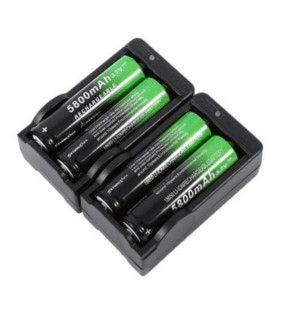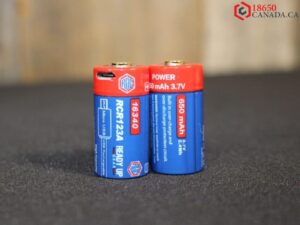Optimal storage for long-term use of your 18650 batteries. Learn the best techniques now
18650 batteries are cylindrical lithium-ion batteries that measure 18 mm in diameter and 65 mm in length. They are named after their size and shape, which is similar to an AA battery but slightly larger. They have a nominal voltage of 3.7 V and a typical capacity of around 3000 mAh, which means they can store and deliver more energy than other types of batteries.
They are widely used in various devices, such as laptops, power tools, electric vehicles, and vaping devices. But they are also ideal for flashlights and headlamps, especially those that require high performance and durability.However, 18650 batteries need proper storage to preserve their lifespan and avoid potential risks.
Like any other lithium-ion battery, 18650 batteries can degrade over time due to various factors, such as temperature, humidity, charge level, and protection. If not stored properly, 18650 batteries can lose their capacity and performance, or even cause fire or explosion. Therefore, it is important to know how to store your 18650 batteries properly and preserve their lifespan.
In this article, we will show you how to store your 18650 batteries properly and preserve their lifespan. We will explain the main factors that affect the lifespan of 18650 batteries and how to store them accordingly. We will also give you some tips on how to check and use your 18650 batteries after storage.

Temperature
One of the main factors that affect the lifespan of 18650 batteries is temperature. Temperature can affect the chemical reactions inside the cells and cause damage or degradation. High or low temperatures can harm the cells and reduce the capacity and performance of the batteries.Therefore, you should store your 18650 batteries in a cool and dry place, away from heat sources or direct sunlight.
The ideal temperature range for storing 18650 batteries is between 10°C and 25°C (50°F and 77°F). You should avoid storing your 18650 batteries in extreme hot or cold conditions, such as in a car or a freezer. Extreme heat can cause the cells to overheat and swell up, which can lead to leakage or explosion. Extreme cold can cause the cells to freeze and crack, which can lead to short circuits or reduced output.
Humidity
Another factor that affects the lifespan of 18650 batteries is humidity. Humidity can affect the metal components inside the cells and cause corrosion or leakage. Moisture or liquids can also cause short circuits or fire hazards if they come into contact with the terminals or wires of the batteries.
Therefore, you should store your 18650 batteries in a sealed and waterproof container, away from moisture or liquids. The ideal humidity level for storing 18650 batteries is between 40% and 60%. You should avoid storing your 18650 batteries in moist or wet environments, such as in a bathroom or a basement.
Moisture can cause rust or oxidation on the metal parts of the cells, which can reduce the conductivity or efficiency of the batteries. Liquids can cause electrolyte leakage or chemical reactions on the cells, which can damage or destroy the batteries.
Charge Level
Another factor that affects the lifespan of 18650 batteries is charge level. Charge level can affect the stress and degradation of the cells over time. Fully or empty charged batteries can cause more stress and degradation than moderately charged batteries.
Therefore, you should store your 18650 batteries at a moderate charge level, around 40% to 60%. This is the optimal charge level for storage, as it minimises the stress and degradation of the cells while maintaining enough energy for future use. You should avoid storing your 18650 batteries at full or empty charge levels, as they can cause more harm than good.
Full charge levels can cause overcharging and overheating of the cells, which can lead to leakage or explosion. Empty charge levels can cause undercharging and deep discharge of the cells, which can lead to irreversible capacity loss or damage.
Protection
Another factor that affects the lifespan of 18650 batteries is protection. Protection can prevent short circuits and physical damage of the cells during storage. Short circuits or physical damage can cause fire or explosion of the batteries.Therefore, you should use protective cases or wraps to store your 18650 batteries.
These are specially designed accessories that cover the terminals and body of the cells and prevent them from touching each other or metal objects. They also protect them from scratches, dents, or punctures that can harm the cells. You should avoid storing loose or damaged batteries that have exposed terminals or wires, torn wraps, dents, bulges, leaks.

